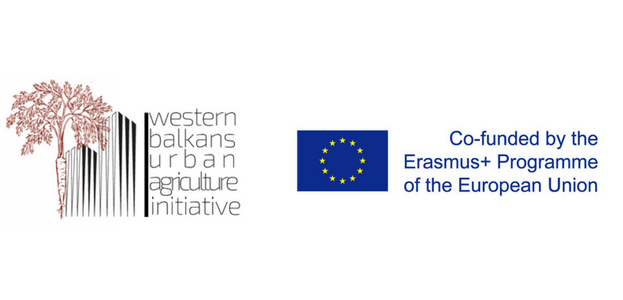
Work Packages
WP 1 – Needs analysis
WP 1 will deliver information important for design of new curricula and LLL program modules, infrastructure development and teachers trainings. According to national and regional priorities, study contents, learning outcomes and required competences will be defined. These will be further fine-tuned by implementing business models, consumer preferences and food chain analyses in partner countries thus proposing market oriented, revenue generating and job creating business models.
Deliverables/results/outcomes:
1.1. Survey guide
1.2. Regional and EU action plans and strategies report
1.3. Farms models in region
1.4. Food supply chains analysis
1.5. Consumers preferences surveys
1.6. City-adjusted farm strategies in B&H, MN and XK
1.7. Partners HEIs infrastructure and teacher’s assessments
WP 2 – Curriculum modules and LLL center programs development
WP 2 comprises the activities necessary for design and implementation of new master study curriculum and LLL programs at WB HEIs. WP will establish 4 expert groups for curriculum writing. WP will discuss, propose and develop new study contents based on learning outcomes, to meet national and regional strategies for socio-economic development, entrepreneurial and job markets and urban ecology and efficiency according to the reports delivered in WP1.
Proposed curriculum will have to demonstrate the ability to:
-Incorporate required competences and learning outcomes to meet defined present and future needs and to overcome gaps between them;
-To equip students with knowledge, competence and skills to explore and exploit (socially and entrepreneurially) overgrowing urban demand for high quality food, better energy efficiency, urban ecology and sustainably, etc, in innovative way which will bring benefits to the society;
-To promote problem solving attitude and skills utilizing available means, encouraging students for lifelong learning process.
-That the learning process and outcomes can be evidenced in such a flexible way that it satisfies the demands of individual learners (in different operational settings, stages and environments) and stakeholders who are potentially interested in their competences.
Deliverables/results/outcomes:
2.1. Curriculum draft
2.2. Learning projects design guide for teachers
2.3. Skills and competence evaluation guide
2.4. Master study and LLL program elaborate
2.5. Module Placement Guide
2.6. Diploma supplement (DP)
2.7. Multilateral inter-institutional agreements
WP 3 – Developing capacities and facilities
WP 3 comprises the activities necessary to implement new curriculum and LLL programs at WB HEIs. WP activities will ensure EU good practice and technology transfer to WB countries. During project life-time new curriculum and LLL programs will be implemented at 5 WB HEIs.
Deliverables/results/outcomes:
3.1. Infrastructure and teachings staff assessment
3.2. Study visits and trainings
3.3. PBL and EL in competence based learning workshop
3.4. Distance learning guide, manual and workshop
3.5. Development of teaching/training tools
3.6. Purchase and installation of equipment
3.7. Curriculum accreditation
3.8. Curriculum implementation
WP 4 – Quality assurance and monitoring
WP 4 will ensure high quality of the project and its results. WP activities will establish, implement and deliver internal and external quality assurance, control and monitoring mechanisms. WP aim is to ensure quality of curricula and LLL programs, teaching material contests, methodologies, and project overall defined outcomes, timetables and budget.
Deliverables/results/outcomes:
4.1. Quality performance framework
4.2. WPs quality evaluations and QAC functioning
4.3. Evaluation questioners
4.4. Evaluation reports
4.5. External evaluations and costs verification
4.6. Evaluation of curriculum and teaching tools
WP 5 – Dissemination and exploitation
WP 5 will ensure visibility of the project activities, outcomes, achievements, and regular information dissemination for specific and general public, enhancing communication with target groups. WP activities will ensure ongoing contacts with specific public-potential beneficiaries and stakeholders: SMEs, farmers unions, Start-ups organizations, NGOs, HEIs and academic staff, similar UA projects and professionals (at the international level).
WP will design and implement campaigns for general public which will educate and raise awareness about UA principles and benefits but in the same time reach out to potential beneficiaries.
Green Entrepreneurship e-portal will be created and used as virtual association of UA farmers in region. Green Entrepreneurship will explore alternative sales and marketing strategies (e.g. community supported agriculture (CSA), farmer markets, box schemes/delivery services, care farming, rent-a-field concepts, etc) to enhance farmers income thus reducing food carbon footprint.
Deliverables/results/outcomes:
5.1. Dissemination Strategy
5.2. Project web site and social media channels
5.3. Green Entrepreneurship software
5.4. Distance learning platform
5.5. Project promotional materials
5.6. Scientific contributions
5.7. Info days, open door day and UA conference
5.8. Interim and final report on dissemination and exploitation
WP 6 – Project management
WP 6 will ensure effective, adequate coordination and communication framework, between the Consortium partners and other parties, for the successful project implementation. Project management will ensure a smooth flow of the project activities in order to complete them efficiently, according to the planned timetables and allocated budget.
Deliverables/results/outcomes:
6.1. Project management procedures
6.2. Regular meetings
6.3. Management and report on the project activities
6.4. Project finance and administration